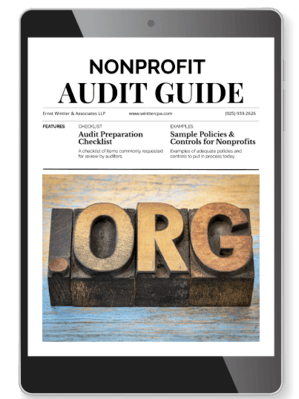For most charitable contributions, the ability to qualify for a tax deduction hasn’t changed under the new tax rules introduced by the Tax Cuts and Jobs Act. However, there are important updates to recordkeeping requirements that nonprofits and donors should be aware of.
Understanding these new tax rules — and helping donors who itemize deductions navigate them — gives your organization a distinct advantage. When nonprofit audit services can clearly explain the tax benefits of contributions, it strengthens donor relationships and encourages greater giving.
Here are the key points to know about these recent rule changes and how they may impact your nonprofit’s financial reporting and donor communications.
Allowable deductions – New Tax Rules
As a rule, the IRS allows donors to deduct their total contributions of money or property, so long as it doesn’t exceed 60% of their adjusted gross income. While the allowable deduction amounts vary by contribution type, cash donations are 100% deductible. To claim the deduction, however, the donor must maintain proof of the contribution.
One situation where the whole value cannot be deducted is donations of ordinary-income property, defined as something that would’ve been subject to short-term capital gains or income taxes if sold. In this situation, donors can only deduct the tax basis in the property, which is typically the purchase price. That means that a donor needs to determine the fair market value (FMV) and subtract the amount that would be ordinary income or short-term capital gains if they’d sold the property instead of donating it.
When FMV applies
Generally, donors can deduct the FMV of capital gains property. Property is considered “capital gains property” any time that the donor would’ve realized long-term capital gains if the property had been sold for FMV on the donation date. Normally this is true if the asset was owned for more than a year. There are exceptions, such as intellectual property donations, where only the donor’s tax basis is deductible.
If you use tangible donated property for the organization’s tax-exempt mission, then your donor can deduct the FMV of donated property. On the other hand, if the property is used for something unrelated to the institutional mission then the deduction is limited to the donor’s tax basis. Be sure you understand this restriction, or ask your nonprofit audit services provider.
Documentation requirements
Property donations have different documentation requirements based on their deductible value. If someone donates an item worth:
- Less than $250, they’ll only need a receipt from your nonprofit.
- Between $250 and $500, the donor must have contemporaneous written acknowledgment.
- Between $501 and $5,000, the donor must also file Form 8283.
- More than $5,000, the donor must obtain a qualified appraisal. The IRS won’t just take their word for it.
Other donations
Donors can’t get a deduction for everything they give. In general, only donations of the full ownership interest in property are tax-deductible. The right to use property free of charge is considered a contribution of less than the donor’s entire interest in the property, and isn’t deductible. Occasionally, a donor can still receive a deduction for a partial-interest donation, such as with a qualified conservation contribution. Rules for these donations are specific, and donors should ask their tax professional for advice.
Lastly, donors can’t claim a deduction for the donation of their professional services. However, related out-of-pocket costs, such as supplies and miles driven, are deductible as charitable contributions. Donors should keep careful records for these item donations, in accordance with the table above and IRS mileage guidelines.
Look out for their interests
Take time to make sure your donors understand the tax implications of their gifts. It can help them avoid unpleasant surprises down the road — and keep them loyal to your nonprofit. By making sure they, and you, are aware of requirements you are also protecting the organization from potential liability.
Ernst Wintter & Associates LLP specialize in California nonprofit audit and tax preparation services. Contact us today for help with your non-profit audit or tax prep needs.








